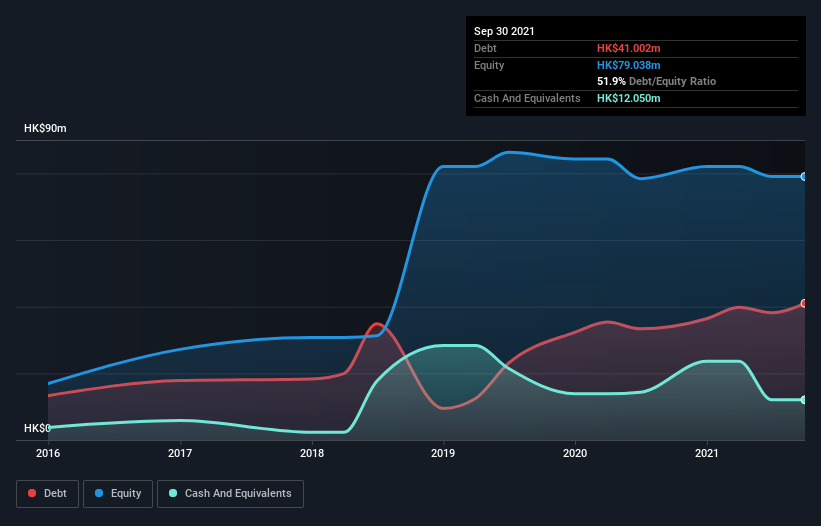Some say volatility, rather than debt, is the best way to think about risk as an investor, but Warren Buffett famously said that 'Volatility is far from synonymous with risk.' So it might be obvious that you need to consider debt, when you think about how risky any given stock is, because too much debt can sink a company. Importantly, Tong Kee (Holding) Limited (HKG:8305) does carry debt. But is this debt a concern to shareholders?
When Is Debt A Problem?
Generally speaking, debt only becomes a real problem when a company can't easily pay it off, either by raising capital or with its own cash flow. In the worst case scenario, a company can go bankrupt if it cannot pay its creditors. However, a more common (but still painful) scenario is that it has to raise new equity capital at a low price, thus permanently diluting shareholders. By replacing dilution, though, debt can be an extremely good tool for businesses that need capital to invest in growth at high rates of return. When we think about a company's use of debt, we first look at cash and debt together.
See our latest analysis for Tong Kee (Holding)
How Much Debt Does Tong Kee (Holding) Carry?
You can click the graphic below for the historical numbers, but it shows that as of June 2021 Tong Kee (Holding) had HK$41.0m of debt, an increase on HK$33.3m, over one year. However, it does have HK$12.1m in cash offsetting this, leading to net debt of about HK$29.0m.

A Look At Tong Kee (Holding)'s Liabilities
The latest balance sheet data shows that Tong Kee (Holding) had liabilities of HK$94.6m due within a year, and liabilities of HK$998.0k falling due after that. Offsetting this, it had HK$12.1m in cash and HK$134.4m in receivables that were due within 12 months. So it can boast HK$50.9m more liquid assets than total liabilities.
This luscious liquidity implies that Tong Kee (Holding)'s balance sheet is sturdy like a giant sequoia tree. On this view, lenders should feel as safe as the beloved of a black-belt karate master. There's no doubt that we learn most about debt from the balance sheet. But you can't view debt in total isolation; since Tong Kee (Holding) will need earnings to service that debt. So when considering debt, it's definitely worth looking at the earnings trend. Click here for an interactive snapshot.
Over 12 months, Tong Kee (Holding) reported revenue of HK$182m, which is a gain of 2.1%, although it did not report any earnings before interest and tax. That rate of growth is a bit slow for our taste, but it takes all types to make a world.
Caveat Emptor
Over the last twelve months Tong Kee (Holding) produced an earnings before interest and tax (EBIT) loss. Indeed, it lost HK$4.3m at the EBIT level. Looking on the brighter side, the business has adequate liquid assets, which give it time to grow and develop before its debt becomes a near-term issue. Still, we'd be more encouraged to study the business in depth if it already had some free cash flow. So it seems too risky for our taste. The balance sheet is clearly the area to focus on when you are analysing debt. However, not all investment risk resides within the balance sheet - far from it. These risks can be hard to spot. Every company has them, and we've spotted 3 warning signs for Tong Kee (Holding) (of which 1 is a bit unpleasant!) you should know about.
Of course, if you're the type of investor who prefers buying stocks without the burden of debt, then don't hesitate to discover our exclusive list of net cash growth stocks, today.
New: Manage All Your Stock Portfolios in One Place
We've created the ultimate portfolio companion for stock investors, and it's free.
• Connect an unlimited number of Portfolios and see your total in one currency
• Be alerted to new Warning Signs or Risks via email or mobile
• Track the Fair Value of your stocks
Have feedback on this article? Concerned about the content? Get in touch with us directly. Alternatively, email editorial-team (at) simplywallst.com.
This article by Simply Wall St is general in nature. We provide commentary based on historical data and analyst forecasts only using an unbiased methodology and our articles are not intended to be financial advice. It does not constitute a recommendation to buy or sell any stock, and does not take account of your objectives, or your financial situation. We aim to bring you long-term focused analysis driven by fundamental data. Note that our analysis may not factor in the latest price-sensitive company announcements or qualitative material. Simply Wall St has no position in any stocks mentioned.
About SEHK:8305
Sheng Tang Holdings
An investment holding company, operates as a multi-disciplinary contractor in the construction industry in Hong Kong.
Flawless balance sheet with slight risk.
Market Insights
Community Narratives



